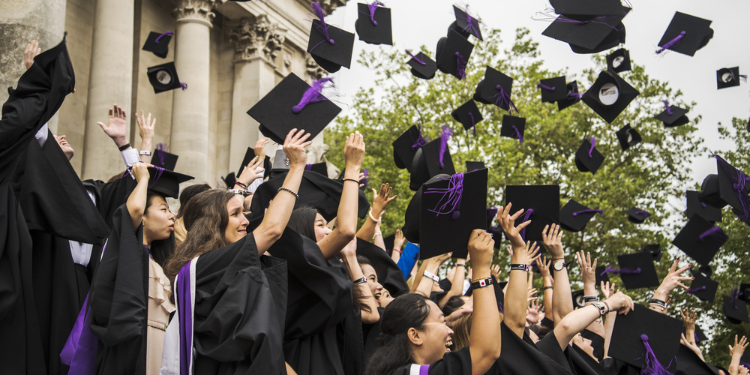
The Times reports that the UK's Home Office is considering reducing the post-study work rights of international students from 2 years to 6 months. This follows discussions within the government since late 2022 about capping international student numbers. If these are actually applied, they might drastically reduce the attractiveness and accessibility of the UK for overseas students and expats.
What is the Graduate Visa?
Back in 2012, British Prime Minister David Cameron eliminated automatic post-graduation work rights for international students in an effort to curb migration. This visa existed in some form between 2004 and 2011. Fast forward to July 2021, and the government of Boris Johnson – of the same Conservative Party as Cameron – decided to reinstate these rights under the Graduate Visa.
This visa gives all international graduates from British universities the automatic right to remain in the UK for 2 years post-graduation. They do not need a job offer, they can work outside of their field (even in “low-skilled” jobs in hospitality, retail or caretaking), and their dependents (spouse, children) can stay with them.
The creation of the Graduate Visa boosted non-EU student applications. The UK government aimed to attract 600,000 international students in 2022, but 680,000 undergraduate and postgraduate students actually enrolled, according to the Higher Education Statistics Agency. It has exceeded the target by nearly 100,000.
The sharpest rise in enrolment came from Nigerian and Indian students. The education consultant Total Student Care reports that nearly 66,000 Nigerians came to study in the UK in 2022, as compared to only around 8,000 in 2019. The PIE News reports that applications from American students have also increased moderately since the Graduate Visa was launched. About 7,000 Americans applied through the UCAS (Universities and Colleges Admissions Service) platform in 2021, as compared to only around 4,000 in 2019. Only application numbers from China have stagnated owing to how its borders only recently fully reopened.
The Graduate Visa benefits both prospective expats and the British economy
International students' tuition fees in the UK are among the highest in the world. For Fall 2023, they range between £15,000 and £32,000 per year. Self-funding international students may see this as a worthwhile financial sacrifice if they know they can work in the UK for a couple of years afterwards. Both Nigeria and India, for instance, have currencies that are far less powerful than the pound. The financial sacrifice they make is often greater than that of American or European students.
Alan Manning, an economics professor at the London School of Economics, writes on the Electronic Immigration Network that earning in pounds while working part-time during their studies and then full-time for at least 2 years after graduating is enough to recover the cost of their studies – even repay any educational loans back home. He stresses that British “universities are not just selling education but also, in part, work permits.”
Manning also stresses that international students' high tuition fees, in turn, fund the education of British citizens (who pay 50% less) and the research conducted at these universities. The Russell Group, an association of the top British research universities, analyzed the economic impact that international students have on the UK. They found that, on average, each student generates a total of £132,000 for the British economy. They state that each international student cohort brings £25.9 billion to the economy even after the cost that they incur from the state is deducted.
Reducing post-study work rights could be a blow to international students' dreams of working in the UK
How is Suella Braverman, the Home Secretary, considering modifying this visa? The Times reports that she is pushing to drastically reduce post-study work rights under the Graduate Visa from 2 years to a mere 6 months.
As previously said, the UK received nearly 100,000 more international students than predicted in 2022; this could be a move to ensure that the number of students remains within the desired target. The Home Office is including international students in its overarching goal of reducing net migration. There were 504,000 new expats in the UK in 2022, a stunning increase of 331,000 in a single year.
The Times reports that officials of the Home Office have also said that international students doing “low-value” degrees are those who will face more restrictions. For one, they might no longer be allowed to bring their dependents with them. The officials haven't clarified which degrees are considered “low-value,” but it's possible to guess that arts/humanities degrees, or degrees unrelated to science, technology or finance, might be the target here. Smaller, younger universities that are not part of the Russell Group or ranked worldwide might also be targeted. These tend to be more affordable for international students because their tuition fees are lower.
Back in late 2022, Prime Minister Rishi Sunak had hinted at even going as far as capping the number of international students who could enter the country. He also mentioned targeting “low quality” degrees and allowing international students only in top universities. Back then, many higher education bodies had condemned this proposal, saying that it would be a financial catastrophe for other universities.
The Home Secretary's proposed amendment to post-study work rights is eliciting the same backlash – not only within the higher education sector but also within her own government. The Department of Education, the Treasury, the Department for Business, Energy and Industrial Strategy and the Department for International Trade have all expressed their opposition to it.
Gillian Keegan, the country's Education Secretary, told The Financial Times that international students bring a “hugely valuable” economic boost to the higher education sector. She believes that British universities are “a great advert to our country” and that this abrupt reversal will damage the UK's international reputation.
The director of Universities UK International, Jamie Arrowsmith, warns in The PIE News that this move would make the UK fall behind its competitors in international education. For example, Australia, where international tuition fees are slightly higher than in the UK, allows international students to work for 2 to 5 years in the country after graduating. Six months can clearly not compete with that.
International students who entered the UK in the last few years might now be facing an uncertain future. They might risk deportation if they cannot find a high-skilled and high-skilled job related to their degree within 6 months of graduating. For now, international students can take any job – tutoring, aged care work – until they find the job of their dreams. For those who took hefty educational loans to come to the UK and knew they'd be able to pay it back in pounds, this might also signal financial ruin.
Braverman's proposal comes a mere 1.5 years after the Graduate Visa was launched. An undergraduate who arrived in 2021 and who should graduate by 2024 might not be dealing with the same conditions under which they agreed to study in the UK. Some students had even been dropping out of their degree to join the workforce when they got a good offer – if Braverman's amendment is approved, they might also become impossible.
Braverman and Keegan are still discussing their options and trying to find a compromise between their diametrically opposing views. The uncertainty is still hanging heavy for international students, and they'll have to wait for at least a few weeks before they can get a clearer sense of which direction the British government is taking.



















